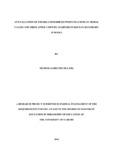| dc.contributor.author | Munene, James N | |
| dc.date.accessioned | 2016-11-16T11:33:02Z | |
| dc.date.available | 2016-11-16T11:33:02Z | |
| dc.date.issued | 2016 | |
| dc.identifier.uri | http://hdl.handle.net/11295/97445 | |
| dc.description.abstract | This study assesses the effectiveness of teaching moral values in achieving upright moral behavior which is to be evident in the learner’s daily life in Kenyan schools. The study adopted the deontological theory of morality as its theoretical framework, and employed critical method to gather and analyze relevant information. The study concluded that the poor state of discipline in Kenyan secondary schools can be attributed to the methods thus far employed for moral development. This is evident in that the subjects meant to instill moral values in the learners such as CRE are emphasized more on the examination part of it rather than on the moral values it instills in learners, hence the need for a new approach to this important endeavor of instilling moral values.Consequently the study recommends those subjects that instill moral values in learners, such as Religious Education,to be made compulsory in Kenyan secondary schools. | en_US |
| dc.language.iso | en | en_US |
| dc.publisher | University of Nairobi | en_US |
| dc.rights | Attribution-NonCommercial-NoDerivs 3.0 United States | * |
| dc.rights.uri | http://creativecommons.org/licenses/by-nc-nd/3.0/us/ | * |
| dc.title | An Evaluation Of The Relationship Between Teaching Of Moral Values And Their Application By Learners In Kenyan Secondary Schools | en_US |
| dc.type | Thesis | en_US |



